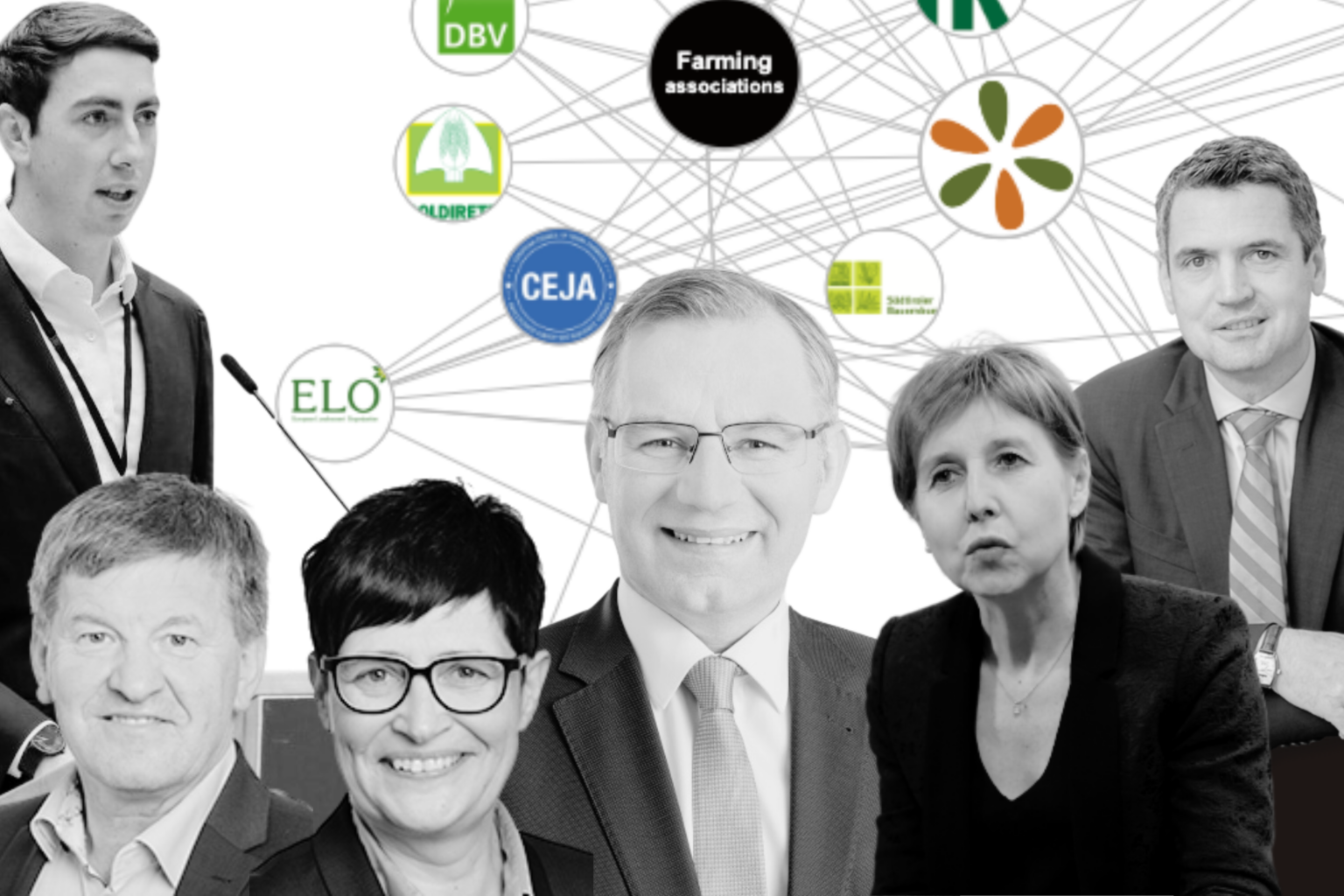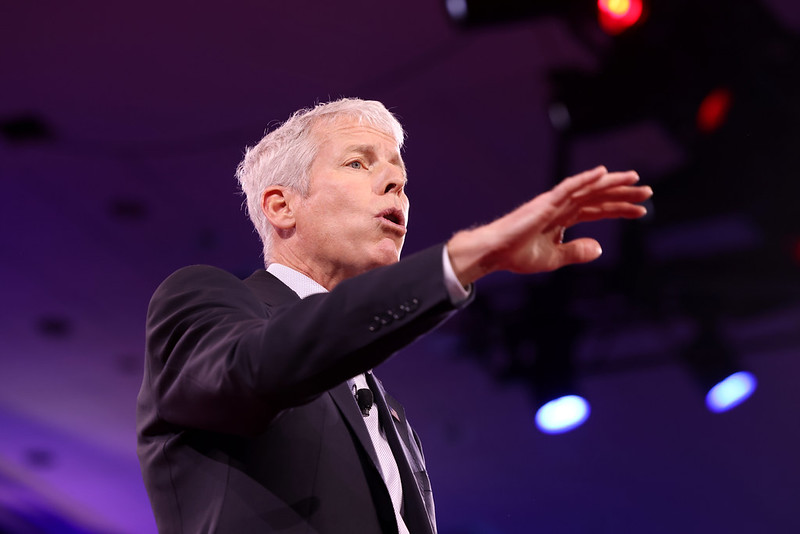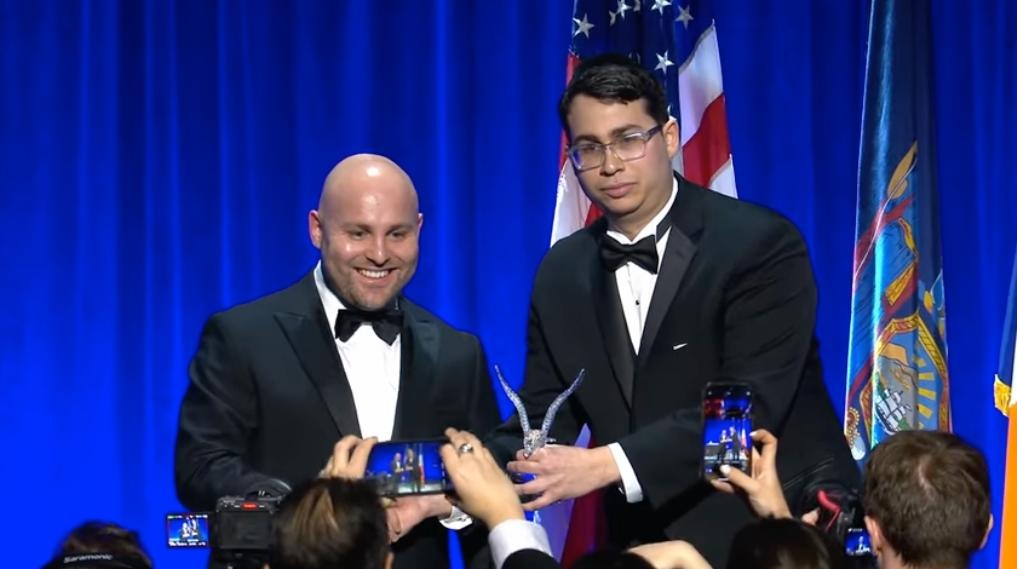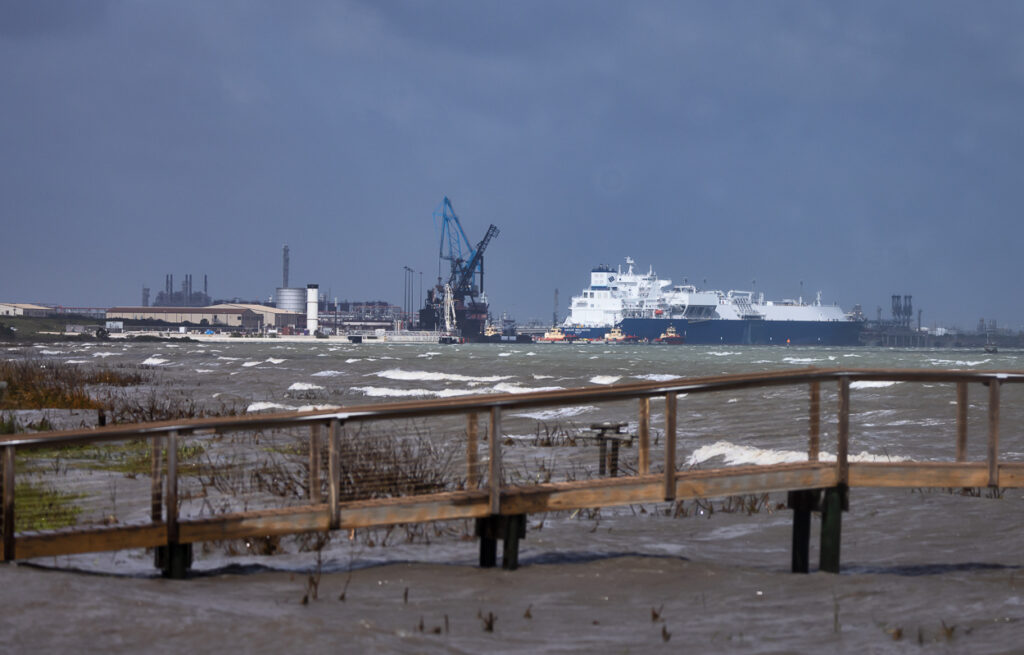Striding out on alpine hikes, mingling at rooftop soirées and lending office space free of charge – these are just some of the ways Big Ag has sought to win over influential EU lawmakers on critical green reforms in recent years.
These relationship-building activities have helped to forge a powerful alliance in Brussels between select politicians from the centre-right European People’s Party (EPP) and those with a commercial interest in slowing moves to more nature-friendly farming: pesticide manufacturers and farming unions linked to industry.
A major investigation published earlier this month by DeSmog and Politico revealed the high volume of meetings held by six key EPP parliamentarians. It found the farming industry had an average of two meetings a week with those politicians since 2020, as the EU negotiated flagship reforms to protect nature and climate.
DeSmog has now gone deeper, mapping the extensive personal and professional ties between the group of six conservative MEPs and groups linked to the agriculture industry.
We chose to highlight the parliamentarians’ connections to the most powerful EU actors that are hostile to plans to cut pesticides – a group that includes the biggest farming unions. In addition, we included agricultural groups to which MEPs had personal ties.
The nature of the links featured on the map range from direct contact in meetings, at socials and on hikes, as well as membership of industry-linked organisations and committees.
The lobbying blitz captured on the map appears to have yielded results. In the three years since Farm to Fork – an ambitious plan to overhaul farming practices as part of the Green Deal – was first announced, lawmakers from the conservative EPP have consistently fought back against plans to transform agriculture.
Reforms include measures to halve pesticide use across the bloc – proposals that have alarmed an industry worth €12 billion in Europe alone each year. Scientists say the raft of green measures, aimed at tackling spiralling climate breakdown and biodiversity collapse, are crucial for the future of Europe’s food supply.
DeSmog’s revelations come ahead of a major vote on the pesticide reduction law by the EU’s environment committee, which is due to take place on October 24.
Campaigners and green politicians fear the law could be considerably weakened, amid mounting pressure from national ministers to strip out legally binding targets for member states.
“These revelations add to the growing evidence that powerful industry interests are simply buying influence in the name of profit margins, at catastrophic expense to people and planet,” said Célia Nyssens-James from the European Environmental Bureau, the bloc’s largest network of not-for-profit environmental groups. “Clearly too many MEPs on this Committee do not have European citizens’ best interests at heart.”
Clara Bourgin from Friends of the Earth said: “These ties are both appalling and sadly unsurprising. When certain MEPs strongly push back against EU pesticide law and binding reduction goals, and more broadly against European environmental commitments, it’s clear that intensive industry lobbying is behind it.”
Franc Bogovič, one of the six MEPs in the analysis, denied that policymakers were under the influence of industry.
“I’m a farmer and … I’m an agricultural engineer and I have my own opinion,” he told Politico Europe. “I really don’t need their [industry groups’] opinion on this. I have my own clear view of what is possible and what is not possible in agriculture.”
Zoom in and click on the circles/lines to find out more about the individuals and groups involved. Map designed by Joey Grostern and Clare Carlile.
Anti-Green Conservative Parliamentarians
At the heart of this dense lobbying network in the above map are six lawmakers who have consistently bid to weaken the EU’s green farming reforms as they make their passage into law.
MEPs Alexander Bernhuber, Herbert Dorfmann, Norbert Lins, Christine Schneider, Franc Bogovič and Anne Sander are all part of the centre-right European People’s Party, the largest political grouping in the European Parliament which has drawn criticism for repeatedly seeking to water down strategies such as Farm to Fork and the 2030 Biodiversity Strategy.
These MEPs hold senior positions that enable them to wield significant influence in the green policy arena. For example Norbert Lins, chair of the agriculture committee, demanded a major reassessment in December of the pesticide reduction file on behalf of the committee, a controversial move that led to campaigners accusing him of trying to delay the legislation.
Another of the six, Alexander Bernhuber, the EPP’s chief negotiator on SUR (pesticide reduction regulation), has previously called for it to be withdrawn altogether.
The EPP has been accused of using blackmail and spreading fake news to oppose plans to restore 20 percent of damaged ecosystems in the EU via the Nature Restoration Law, allegations that are denied by party leader Manfred Weber.
The party also drew criticism in July, when it substituted over a third of its regular members on the environment committee to try to defeat a crucial vote on the law. The bussed-in EPP representatives included Herbert Dorfmann, Anne Sander and Franc Bogovič, three other MEPs who feature in DeSmog’s sample.
The six MEPs analysed by DeSmog were found to have collectively met industry-linked groups eight times as often as non-governmental groups representing public interests.
Personal Ties with Industry-Linked Farming Unions
The six EPP parliamentarians have extensive ties to major farming unions in the EU, which feature in the top left corner of the map.
DeSmog’s analysis found that the MEPs met the union Copa-Cogeca – and its influential French and German members, Fédération Nationale des Syndicats d’Exploitants Agricoles (FNSEA) and Deutscher Bauernverband – 40 times between January 2020 and July 2023. It also found that over 75 percent of meetings on the topic of Farm to Fork, the Nature Restoration Law and the Sustainable Use of Pesticides Regulation were with Copa-Cogeca, its national members or their regional branches.
Copa-Cogeca is the largest union representing farmers and agri-cooperatives in the bloc. Long at the heart of EU agricultural policy, it has been described by The New York Times as holding “special access that would make others swoon”. But it’s a controversial group among farmers. In a recent investigation by Lighthouse Reports and Politico, it admitted to inflating its membership and was accused of promoting industrial farming interests over those of smaller farms and young farmers.
The union has vehemently opposed the Farm to Fork reforms, which it has labelled as “overambitious and irresponsible” for EU agriculture and, it says, will lead to significant drops in EU production and risks to food security. The claims are contested by scientists and campaigners.
The latest research from DeSmog reveals how Copa-Cogeca’s national members also hold extensive personal ties with the six MEPs.
These connections include family ties. For example, French MEP Anne Sander – who was a major negotiator on recent reforms to EU farming subsidies and on plans to restore degraded ecosystems in the bloc – is the sister of Franck Sander, a vice president of the Fédération Nationale des Syndicats d’Exploitants Agricoles (FNSEA). The French farmers union dominates agricultural policy making in France and is staunchly opposed to Farm to Fork, which it has called a “degrowth strategy”.
Since the launch of Farm to Fork in 2020, Anne Sander has held at least 12 meetings with FNSEA or its regional branches – half of which were not declared on the parliamentary website. A quarter of all Sander’s official meetings on the CAP farming subsidy reforms were with the union or its branches. In contrast, Sander did not hold a single registered meeting with non-profits on the topic.
In Austria, farming union Österreichischer Bauernbund (ÖBB) has a direct link to the EPP, as it is part of the European conservative’s local political party, the Österreichische Volkspartei.
Records show the ÖBB union also pays for office space for the Austrian EPP parliamentarian featured in the DeSmog map, Alexander Bernhuber, who is an MP with the Österreichische Volkspartei.
Bernhuber is a member of the executive committee for one of ÖBB’s nine branches, Niederösterreichischer Bauernbund, where he was also employed as a paid consultant between 2017 and 2019 (earning between €1,000 and €5,000 a month).
The ÖBB union is also the dominant organisation within Copa-Cogeca’s national member Landwirtschaftskammer Österreich (LKÖ), which represents agribusinesses as well as farmers.
Every summer, ÖBB, LKÖ and other powerful farming associations are joined by Italian MEP Herbert Dorfmann (featured on the map) and other influential politicians for a hike in the alps. The stoll offers the groups the chance to chat about EU policy, with Copa-Cogeca’s German member Deutscher Bauernverband using last year’s opportunity to tell participants, “we have to reconsider this [pesticide reduction] plan.”
“It is evident that numerous conservative MEPs from the EPP group are historically very close to Copa-Cogeca, the farm lobby that mostly defends the interests of the largest farms and land owners, rather than the farming sector as a whole,” said Nina Holland, of lobby watchdog Corporate Europe Observatory.“This staunch group of MEPs, by constantly trying to delay and derail the pesticide reduction law, pretend to be on the side of farmers, but are in fact doing them a great disservice”.
Deutsche Bauernverband – a German farming union and member of Copa Cogeca that features on the map – told DeSmog that the group engages MEPs from all democratic parties. It added that they support Farm to Fork and “offer constructive criticism and recommendations on the regulatory approaches to implement political objectives”.
‘Exclusive’ Access for Pesticide Companies
DeSmog’s analysis shows that pesticide companies also enjoyed privileged access to the European People’s Party.
A formidable lobbying force in Brussels, the industry has a range of ways to reach decision-makers via sponsorship and support for influential networks, discussion forums and think tanks. Since plans to halve pesticide use were first announced in 2020, records show it has spent €35 million on EU lobbying.
The four largest pesticide companies – Bayer, Syngenta, BASF and Corteva – along with their powerful trade association CropLife Europe held a total of 29 official meetings with the six selected MEPs since 2020.
CropLife Europe told DeSmog that it “embrace[s] the ambitions of the EU Green Deal and Farm to Fork strategy”. The organisation has previously described targets to reduce pesticide use as “non-data based” and “political” and called for them to be reassessed.
DeSmog’s map shows that CropLife Europe is also a “strategic partner” of EU40, a network for young politicians in the EU, whose current members include Alexander Bernhuber, along with over 50 serving EU politicians. The group also has more than 200 MEP alumni, among them Norbert Lins and Herbert Dorfmann.
While the EU40 – whose other partners include seed breeding company KWS, and a range of pharmaceutical and tech firms – describes itself as neutral and denies “representing commercial interests”, its strategic partners are granted special access to political members during events including its “exclusive” annual summer party, pitched as the “most iconic” in the EU.
EU40 described the 2023 “soirée” in September, which featured cocktails, an open bar and dancing on the terrace of five star Brussels hotel Sofitel, as “an opportunity to network with Brussels’ finest” and “a hotspot” for MEPs, their accredited parliamentary assistants, and young officials from the European Commission, European Council, as well as permanent representatives to the EU.
Pesticide-Funded Initiatives and Think Tanks
EU40 is not the only route to influence for the industry. DeSmog’s map reveals a wider network of initiatives and think tanks, which give pesticide interests access to the MEPs and other politicians.
Take the European Food Forum, an “independent, politically led, non-partisan” platform focused on food and farming, which is “led and governed” by MEPs, including Christine Schneider, featured in the DeSmog map, who frequently hosts its events.
Its business members include Croplife as well as chemical industry association Cefic – which represents BASF and Bayer and other agrochemical giants – and Europe’s biggest fertiliser company Yara.
The organisation confirmed that members provided funding to the group. It told DeSmog: “We are a platform that gathers stakeholders from all sides, with often diverging views”, adding that it aims to favour non-partisan, “transparent and inclusive debate”.
The industry is also tied to think tanks and advocacy groups. According to EU records, Bayer, the world’s largest pesticide firm, “supports” Farm Europe – a think tank focused on rural and agricultural issues, which has called plans to halve pesticide use a “blind shot at EU farming”. The group met twice with Anne Sander, who is featured the DeSmog map, since 2020.
The Italian MEP Herbert Dorfmann is a member of a cross-party group of MEPs that is run by the Consumer Choice Center, a neoliberal advocacy group that has opposed targets to cut pesticide and fertiliser use and has taken funding from the chemical and oil industry.
Bayer told DeSmog that as “the leading agriculture technology company, we have a direct interest in battling climate change and reversing biodiversity loss”.
It added that it “welcomes the objectives of the European Green Deal and supports the ambition to accelerate the transition towards an even more sustainable and resilient food system, and enhanced biodiversity”.
On the question of lobbying, which it championed as “an essential part of the democratic process”, it said: “Of course, Bayer engages on a number of different topics, in multiple countries, and with a variety of stakeholders and organisations.”
A spokesperson for pesticide firm Syngenta said: “Syngenta is monitoring regulatory trends and offers support to lawmakers and policy stakeholders, allowing them to better understand the value of the industry and the products and services it provides to farmers in Europe. All public affairs activities of Syngenta are made transparent in the Transparency Register according to EU law.”
Croplife Europe said: “We embrace the ambitions of the EU Green Deal and Farm to Fork strategy and believe Europe’s farmers must have access to a full toolbox of innovative crop protection solutions to maintain their production as they transition to a more resilient and sustainable farming system.”
Influential Votes
The final plenary decision on the pesticide regulation will take place at the end of November. The next interim vote will take place on Tuesday 24 October at the EU parliament’s environment committee, where at least two of the politicians featured in the map – Alexander Bernhuber and Christine Schneider – will be present.
Voting in the agriculture committee earlier this month gives a flavour of the battle to come. The committee – which included five of the six MEPs analysed by DeSmog – voted to substantially weaken the law, including deleting the idea of using CAP subsidies to support the transition (effectively defunding the proposal) and removing a ban on the use of pesticides in sensitive areas. Franc Bogovič was in a group that tried to move the target pesticide reduction deadline from 2030 to 2040, while other politicians including from the EPP attempted to remove the requirement for legally binding national targets.Christine Schneider, speaking to fellow EPP member Franc Bogovič, was heard by Politico promising that she would defend these decisions in the upcoming environment committee.
With polls revealing widespread concern among European citizens about the impact of pesticide use on the environment (up to 80 per cent according to an August survey) – and numbers of birds and pollinators plummeting in Europe – NGOs say the close relationships highlighted by DeSmog’s maps are a cause for concern.
“This highlights the urgency of increasing transparency about lobbying in the European Parliament,” Célia Nyssens-James from the European Environmental Bureau said, calling for addressing MEPs’ conflicts of interests and tackling “the dominance of the Agriculture Committee on decision-making related to agri-food files”.
Clara Bourgin from Friends of the Earth said: “The upcoming vote will show which MEPs will stand for a healthy and sustainable future and who will bow to the interests of the pesticide industry.”
Additional research by Brigitte Wear and Michaela Herrmann.
Editing by Hazel Healy and Phoebe Cooke.
Subscribe to our newsletter
Stay up to date with DeSmog news and alerts






